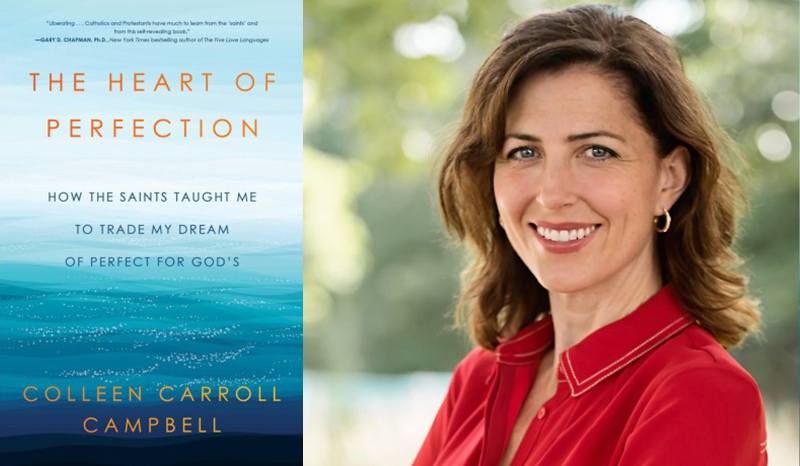(RNS) — The perfectionism that has reached epidemic levels in our culture today is an ancient problem the saints struggled with long before we did. The ranks of recovering perfectionist saints include soldiers and scholars, bishops and beggars, mothers and monks.
One thing nearly all of them had in common was an intense devotion to the heart of Jesus, which Catholics celebrate this Friday (June 28), the feast day of the Sacred Heart.
Unpacking the mystery and apparent oddness of the Sacred Heart devotion was never a project that interested me before I started wrestling with my own perfectionism. I’d seen Sacred Heart images since I was a child: those soft-focus portraits of a sad-eyed, slightly androgynous figure pointing to an exposed, blood-red heart. The pictures were maudlin. And they did nothing for me.
Then I discovered the recovering perfectionist saints, and I decided I needed to understand what it was, exactly, that spoke to them about the Sacred Heart. Why did they see meditating on and imitating the heart of Jesus as the key to their victory over perfectionism?
Even before I dug into Scripture and church history for an answer, I sensed it had something to do with that part of Jesus’ Sermon on the Mount, in the Gospel of Matthew, that has always haunted me as a spiritual perfectionist.
The passage in question is one in which Jesus spells out exactly what it takes to achieve Christian perfection, in terms clearer than any others he uses in Scripture aside from his sell-it-all advice to the rich young man:
“You have heard that it was said, ‘You shall love your neighbor and hate your enemy.’ But I say to you, love your enemies, and pray for those who persecute you, that you may be children of your heavenly Father, for He makes His sun rise on the bad and the good, and causes rain to fall on the just and the unjust. For if you love those who love you, what recompense will you have? Do not the tax collectors do the same? And if you greet your brothers only, what is unusual about that? Do not the pagans do the same? So be perfect, just as your heavenly Father is perfect.”
To be perfect, Jesus seems to say, is to love others even when they hurt us, and to keep loving them even when they keep hurting us. To be perfect is to love as God loves.
It’s a daunting standard. And the more I learn about how perfectionism has shaped my life and personality, the more daunting it seems.
When you’re buried in the pit of perfectionism, you think you have a fighting chance of clawing your way toward this sort of limitless, all-merciful love.
When you’re halfway out, you realize how disoriented you were and how far you still have to go to reach freedom. You see your life in a new and less flattering light: the people and events that taught you as a child that you had to be perfect to be loved; the opportunists who later spotted your perfectionism and exploited it for their own purposes; the mistakes you made with your own children before you realized you were making them — and those you keep making even after you know better.

Pompeo Batoni’s 1767 Sacred Heart of Jesus painting. Image courtesy of Creative Commons
All this reconsidering and reassessing can lead to resentment, even rage, and grief. Forgiveness no longer seems hard; it seems impossible. Loving as heedlessly as God loves feels like a fool’s move, a ticket only to more pain. And all those baby steps you’ve taken toward recovery pale in comparison with the monumental task that looms ahead: the task of learning to love and forgive perfectly, as God does.
All of which brings us back to the Sacred Heart. The saints faced the same temptations to cynicism, despondency and despair that we face. They saw their limits as clearly as we see ours — more clearly, in fact. And they had plenty of reasons to play the victim or play it safe.
Yet the saints chose vulnerability over vindictiveness. They chose to keep their wounded hearts wide open, like Christ’s, to keep loving no matter how many times the world or even their own family and friends hurt them. They chose to draw near to God in their suffering rather than to blame him for it — not once, but again and again.
We see this in the life of Thérèse of Lisieux, who overcame a lifelong struggle with hypersensitivity and people pleasing by recognizing the heart of Jesus as the answer to her infinite, insatiable longing for love — a longing no human being could satisfy.
We see it in Alphonsus Liguori, a renowned theologian and hard-core scruples sufferer, whose freedom from perfectionist fear came through intense focus on God’s merciful love as embodied in Christ’s heart.
And we see it in the lives of Francis de Sales and Jane de Chantal, two recovering perfectionists who joined together to found a religious order dedicated to imitation of Jesus who is “meek and humble of heart” (Matthew 11:29), an order whose vulnerable, heart-centered spirituality defied the cold moralism of their day and nurtured the faith of Margaret Mary Alacoque, the saint most famous for devotion to the heart of Jesus.
Their Sacred Heart devotion helped them make those choices and changes. Reflecting on and drawing near to the heart of Jesus can help us, too, as we seek to escape the final and most pernicious trap of perfectionism: the temptations of stuckness and self-protection, of refusing to forgive others and ourselves for the wounds unearthed on this journey.
Those wounds tempt us to believe that the cool, guarded heart of a perfectionist is our only sure fortress in this fallen world. The surprising truth the saints discovered in the heart of Christ — that real strength and resilience are found only in hearts broken open by love — can set us free.

“The Heart of Perfection: How the Saints Taught Me to Trade My Dream of Perfect for God’s” and author Colleen Carroll Campbell. Courtesy images
(Colleen Carroll Campbell is an award-winning author, print and broadcast journalist and former speechwriter for President George W. Bush. This article is adapted from her latest book, “The Heart of Perfection: How the Saints Taught Me to Trade My Dream of Perfect for God’s.” The views expressed in this commentary do not necessarily represent those of Religion News Service.)





